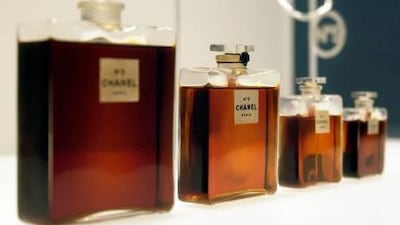This month marks the 90th birthday of Chanel No 5. It is rather surprising that it's still one of the best-selling scents in the world - it is said a bottle is sold every 30 seconds.
It is not even a question of women wanting to smell like their grandmothers, but more like their great grandmothers. It was created by Coco Chanel as a reward for her best customers, and was initially given away in miniature whisky decanters. Then she began to sell them.
Sales were boosted in the US when on being asked what she wore in bed, Marilyn Monroe replied: "Nothing but Chanel No 5." What else explains its success? It is hard to imagine another product that has lasted so long, and which is still making the company US$100 million (Dh367.3m) a year. According to the beauty spy on The National's M magazine, it's timeless, classic and women always want it.
The past couple of weeks have been unusually busy for Twitter. First there was the news that a fund was being created to invest in companies that gained a lot of exposure on the social media site.
It is based on the theory that when the actress Anne Hathaway does publicity for a film, shares in Berkshire Hathaway, Warren Buffet's completely unrelated company, soar in value.
Now these investors want to see if they can emulate this across a range of shares. If they were still publicly traded, Manchester United shares would have soared because Ryan Giggs, a Manchester United footballer, has been revealed on the site as taking out a super-injunction preventing UK newspapers writing about an alleged affair with a Welsh television personality. Apparently almost as many people were tweeting about the liaison as were buying Chanel No 5.
And finally, I have signed up and will soon be telling everybody what I had for breakfast and why I think Christine Lagarde will be the next head of the IMF. You can follow me at twitter.com/rupertus. Can it get any better for the micro-blogging site?
In the film The Enforcer, Harry Callaghan, played by Clint Eastwood, discovers he is about to be transferred to personnel.
"Personnel is for *******s," he says.
"I was 10 years in personnel," replies Capt McKay.
Harry Callaghan looks at him, narrows his eyes and says: "Yeah."
Even in the 1970s, personnel people weren't popular. Now they have been re-branded as "human resources", but this hasn't really helped them. This may be because nobody knows exactly what they do.
However, a document has come into my possession that gives an insight into their cavernous minds. At one company, which should remain nameless, departing employees are asked to share their experiences at the place. It's an esprit de l'escalier, a parting shot of wit on the stairs, or your chance to put the boot into your colleagues without them being able to respond.
One of the questions asks: "What were the most rewarding aspects of your job?" Among the possible answers are: salary; team spirit; physical condition; and, my personal favourite, parking. Now, I know that parking is at a premium in Abu Dhabi, and it can also be a weight on your pocket thanks to Mawaqif, the parking-meter people, but who drives to work just to experience the benefits of his company's covered parking?
And if they find it so desirable, why are they planning to leave - unless they are joining a firm with an underground, airconditioned parking lot?

